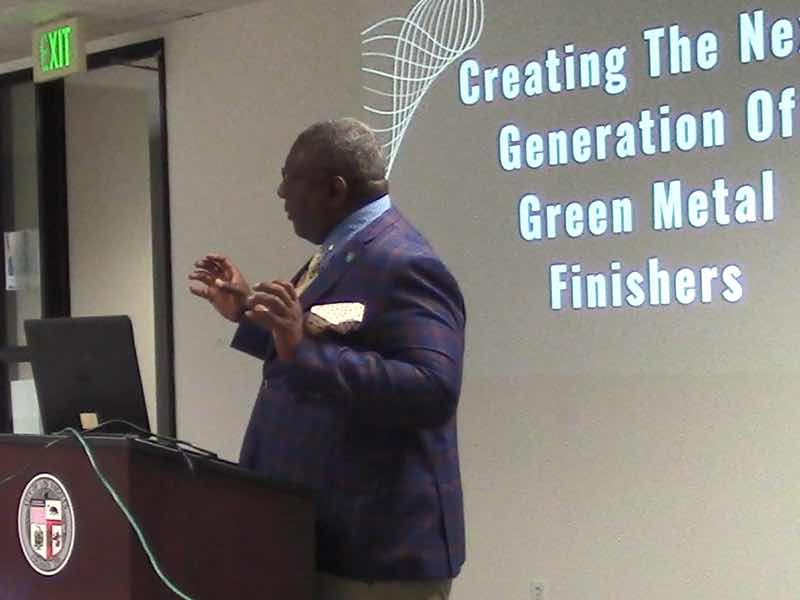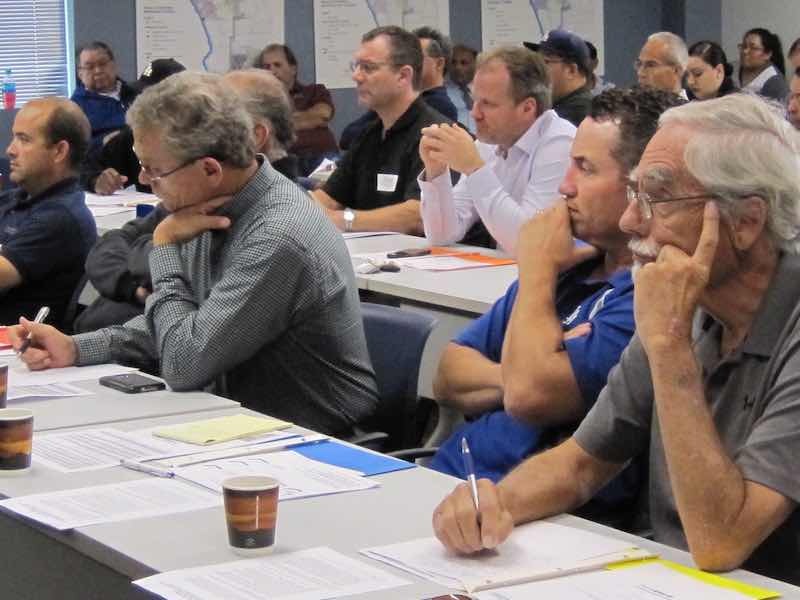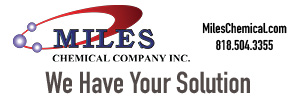The City of Los Angeles Sanitation and Environment (LASAN) Industrial Waste Management Division (IWMD) launched the LA Industry Program in 2016 to increase economic development and business continuity within the city.
Regulated under the EPA, IWMD is the control authority responsible for protecting the environment by having businesses comply with federal and local regulations. IWMD’s Pretreatment Program encompasses a multipronged approach that aims to positively impact three areas — people, the planet, and profitability — at the pollution prevention level.
To further enhance this “triple bottom line,” LA Industry was developed to help interested businesses move beyond mere compliance to a business-friendly culture of collaboration. LA Industry’s Sector Champions utilize an educational approach, organizing outreach activities and forums that spread knowledge of evolving regulations and advances in science and technology.
Nurturing Pollution Prevention and Sustainability
 Michael Simpson, Manager of IWMD, asked attendees to share some current challenges faced by their businesses. LA Industry nurtures pollution prevention and sustainability programs that:
Michael Simpson, Manager of IWMD, asked attendees to share some current challenges faced by their businesses. LA Industry nurtures pollution prevention and sustainability programs that:
- Guide businesses to achieve environmental objectives;
- Drive sustainable performance, innovation, and competition; and
- Stimulate environmentally responsible economic growth and community vitality.
The Sector Champions promote sustainability through education in various industry sectors such as car washes, breweries, groundwater reclamation, industrial laundries, cannabis processing, food manufacturing, and metal finishers.
The Metal Finishing Champion Group (MFCG) reaches out specifically to the surface finishing sector, which is considered Significant Industrial Users (SIUs) and subject to stringent discharge limits and restrictions due to their use of heavy metals. The Environmental Compliance Inspectors (ECIs) of the MFCG also have the great responsibility of educating Metal Finishers, obtaining compliance, and averting potential violations through outreach and guidance.
The MFCG organized a forum on June 29 after a break of nearly two years due to the COVID-19 pandemic. Held at the IWMD offices at 2714 Media Center Drive in Los Angeles, the forum’s theme was Compliance and Science. Attendants were welcomed by Michael Simpson, Manager of IWMD, who asked attendees to share some current challenges faced by their businesses.
How to Find and Retain Personnel
 Among those mentioned was a pervasive challenge among a consensus of attendees, which was the difficulty of finding and retaining personnel. A possible solution was presented by Edward Calleros, ECI, MFCG leader, and forum moderator: the County of Los Angeles is piloting a program promoting the hiring of individuals impacted by the justice system, offering grants and payroll subsidies up to 90% of the new hire’s salary.
Among those mentioned was a pervasive challenge among a consensus of attendees, which was the difficulty of finding and retaining personnel. A possible solution was presented by Edward Calleros, ECI, MFCG leader, and forum moderator: the County of Los Angeles is piloting a program promoting the hiring of individuals impacted by the justice system, offering grants and payroll subsidies up to 90% of the new hire’s salary.
Bryan Leiker, Executive Director of the Metal Finishing Association of Southern California (MFASC), spoke at the event. The MFASC works on behalf of stakeholders state-wide regarding pending and proposed legislation impacting the industry. Leiker highlighted recent amendments to the Air Toxic Control Measures by the California Air Resources Board. These amendments set deadlines to discontinue the use of chromic acid anodizing and functional hard chrome, with the goal of eliminating toxic hexavalent chrome and transitioning to the more benign trivalent chrome. Leiker and the MFASC want to help the forum attendees forecast solutions to the impacts that this legislation will have on their businesses.
Donald Jojola, Chief ECI and leader of the SIU Group was the next presenter of the forum. Jojola explained the permitting process, the importance of permit requirements and conditions, and other regulatory responsibilities, all with “the fundamental principle of reasonableness.” For example, IWMD recently modified the monitoring frequency of metal finishers from bimonthly to semiannually. This change helps metal finishers meet their regulatory obligations on time while providing cost savings that offer some relief in the post-pandemic economy.
Ernesto Lozano, ECI and MFCG member began a 2-part conversation regarding wastewater treatment. Lozano described Best Practical Technologies (BPTs) centered on conventional wastewater treatment methods based on chemistry (such as hydroxide precipitation) and physics, such as screening and settling of solids. These techniques may be efficient, but they can be used to meet discharge limitations only with a full understanding of the science behind them.
Best Available Technologies
Miguel Rodas, Senior ECI and MFCG founding member followed by expounding on Best Available Technologies (BATs), which includes techniques such as ion exchange in recovering precious electroplating bath constituents, water-saving systems, and reverse osmosis. Although only a small number of metal finishers have incorporated BATs into their operations, the improved recovery of metals (precious gold, silver, and rare-earth metals, as well as common but valuable metals like copper and nickel) presents substantial savings on material resources and a reduction of hazardous wastes. Metal finishers are also being pushed to implement new technologies by increasing regulatory demands, such as the imminent PFAS discharge limitations.
Barbara Kanegsberg and Ed Kanegsberg are affectionately known throughout the metal finishing industry as “The Cleaning Lady” and “The Rocket Scientist.” The Founders of BFK Solutions explained the importance of cleaning parts effectively before the finishing of metal surfaces: residues disrupt subsequent processes and ultimately degrade the quality of the finished products. The Kanegsbergs reiterated two sayings: “Begin with the end in mind,” and “The right surface quality is the future of manufacturing” to shift the focus from specific chemicals to examining processes as a whole.
The last of the guest speakers was Michael Sargent of Evoqua-Xylem. He added to the BAT discussion with more details about ion exchange technology. Mr. Sargent spoke on the importance of having scientific objectivity and a supportive local presence, then presented examples of various systems to show their functionality and benefits.
The forum was closed by Jan Marte, ECI and MFCG member, by thanking attendees, reemphasizing the need for collaboration, and inviting everyone to the next forum tentatively scheduled at the end of 2023.
Miguel Rodas is Senior Environmental Compliance Inspector for the IWMD and SIU groups for the City of Los Angeles Sanitation and Environment. Visit www.lacitysan.org. Special thanks to Ryan Walker, ECI and member of the SIU Group at LASAN IWMD, for the comments and review of this article. Contributor: Ryan Walker, ECI; Editor: Jan Marte, ECI



































